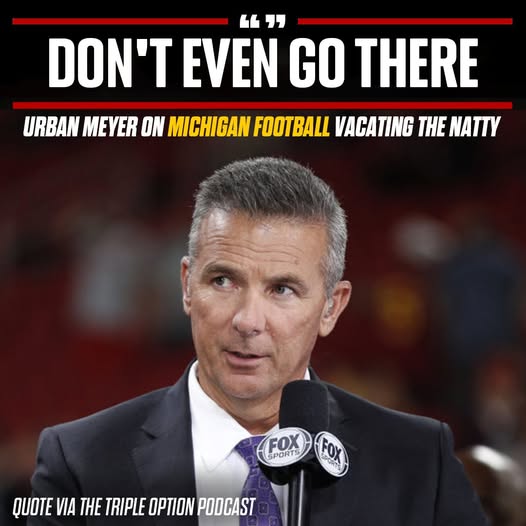
As the NCAA continues to explore the fallout from the investigation into Michigan football’s alleged rule violations during the 2023 season, the specter of penalties looms large. Among the possible punishments being discussed is the vacating of wins, including Michigan’s highly celebrated 2023 national championship. However, one prominent voice in the college football world is making a clear and assertive argument against such a drastic measure: former Ohio State head coach Urban Meyer.
Meyer, whose career has seen both the triumphs of national championships and the pressures of the NCAA spotlight, has come out in defense of Michigan’s 2023 season. He argues that vacating the national title or any wins from that season would not be warranted based on the available evidence and the precedents set by the NCAA in similar cases.
Meyer’s perspective adds a significant layer to the ongoing debate, particularly given his long-standing ties to Ohio State, one of Michigan’s fiercest rivals. As a head coach at Ohio State, Meyer was at the forefront of some of the most high-stakes matchups between the two programs, and his opinion on this matter is one that commands attention in both Columbus and Ann Arbor. In fact, his remarks highlight not just his understanding of the game, but also a deep awareness of how the NCAA navigates the complex and often contentious waters of punishing institutions for rules violations.
The call for Michigan to vacate its 2023 national title or wins stems from the ongoing investigation into allegations of improper conduct within the program. Central to this inquiry is the assertion that the Wolverines may have gained an unfair advantage by violating NCAA rules related to recruitment, team operations, or even game preparation. Such allegations, if proven, could result in significant consequences, including potential vacating of victories, which would be a blow to Michigan’s 2023 legacy.
The idea behind vacating wins is to ensure that teams cannot benefit from unethical practices, preserving the integrity of college football. In the past, the NCAA has used this penalty as a way to address instances where schools have been found to have committed major violations, particularly when those violations were seen as affecting the outcome of games or championships. Notable examples of vacated wins include those involving high-profile programs like Southern California and Penn State, whose victories were nullified after NCAA investigations uncovered major infractions.
In Michigan’s case, however, many feel that such an extreme punishment would be unwarranted. The 2023 season was marked by the Wolverines’ remarkable play on the field, culminating in their first national championship in years. To take away that title or retroactively erase wins from a season that saw Michigan dominate its competition would leave a stain on the sport, creating a precedent where one could argue that the punishment is disproportionately harsh in comparison to the severity of the violations.
Urban Meyer, whose coaching career spans stints at both the University of Florida and Ohio State, has expressed his belief that vacating wins from Michigan’s 2023 season would be an overreaction. Meyer, who led Ohio State to multiple Big Ten championships and a national title during his tenure, has firsthand experience with the pressure that comes with managing a high-profile program while adhering to NCAA rules. Meyer has been involved in various discussions surrounding NCAA penalties, including his own experiences with scrutiny over NCAA violations during his career. His insight into how the NCAA handles investigations makes his opinion particularly valuable.
The former Ohio State coach pointed out that, while the NCAA should absolutely investigate and impose appropriate penalties for any proven violations, there must be a level of reasonableness and fairness in how such penalties are applied. In his view, vacating wins or a championship should not be the automatic result of an investigation, especially if the violations do not directly impact the outcomes of those games in a clear and tangible way.
Meyer made a key distinction between punishment that fits the offense and what might be seen as a more punitive measure that could potentially disrupt the entire college football landscape. According to Meyer, the NCAA should focus on penalties that are directly related to the behavior in question, such as recruiting violations or improper benefits. However, he emphasized that if the violation is not linked to the performance on the field or directly related to manipulating the outcomes of games, the penalties should be less severe.
“Vacating a national title is one of the harshest penalties the NCAA can impose,” Meyer said. “In situations like this, you need to ensure that the punishment is proportionate to the crime. There’s a reason the NCAA has rarely handed down such penalties, and it’s because you have to make sure there’s clear evidence that the violations affected the integrity of the game.”
Meyer’s argument against vacating wins also points to the historical context in which such penalties have been applied. The NCAA has consistently used vacating victories as a measure reserved for situations where there is a direct connection between the violations and the results on the field. In many high-profile cases, such as the vacating of wins by USC in the Reggie Bush scandal or the Penn State Sandusky scandal, the NCAA was able to directly link the infractions to the performance on the field. The violations in these cases were seen as compromising the fairness of competition.
In contrast, Meyer argues that Michigan’s 2023 season may not fit this mold. If the violations at hand do not significantly affect the outcome of games or the fairness of competition, vacating wins would be an unjustified punishment. Meyer suggested that the NCAA should focus more on targeted penalties that address specific issues within the program, such as recruiting sanctions, scholarship reductions, or postseason bans, rather than retroactively erasing victories that have become part of the history of college football.
The larger implications of vacating wins from a championship season would be felt across the entire sport. College football thrives on its traditions, rivalries, and historical achievements, and stripping a program of its title would create a ripple effect that could shake the foundation of the sport. For fans, players, and alumni, the emotional connection to these victories is often more than just about statistics; it’s about pride, identity, and a shared experience.
Meyer stressed that college football needs to be careful not to undermine these traditions by introducing excessive punishments for what may be less impactful violations. In the case of Michigan’s 2023 title, Meyer argued that removing the championship from the record books would diminish the significance of the achievement and lessen the meaning of the victory for everyone involved, from the players to the fans.
“Football is about competition, but it’s also about the stories we tell and the memories we create,” Meyer said. “Vacating a national title would erase the legacy of those players, the coaches, and the fans who all worked so hard to achieve that goal. We have to be careful not to let the penalties become more damaging than the violations themselves.”
As the NCAA investigation into Michigan football continues, Urban Meyer’s perspective adds an important layer to the ongoing discussion about how best to handle the penalties. While the allegations against Michigan should not be taken lightly and the NCAA must take appropriate action if violations are found, Meyer’s argument that vacating the 2023 national title or wins would be disproportionate holds significant weight. He advocates for a measured and fair approach to sanctions, one that ensures the integrity of college football while also protecting the achievements of players, coaches, and institutions.
In the end, the question of how the NCAA should handle Michigan’s 2023 season is one that requires careful consideration. Meyer’s voice reminds us that while accountability is crucial, the broader impact of penalties on the sport must not be overlooked.





